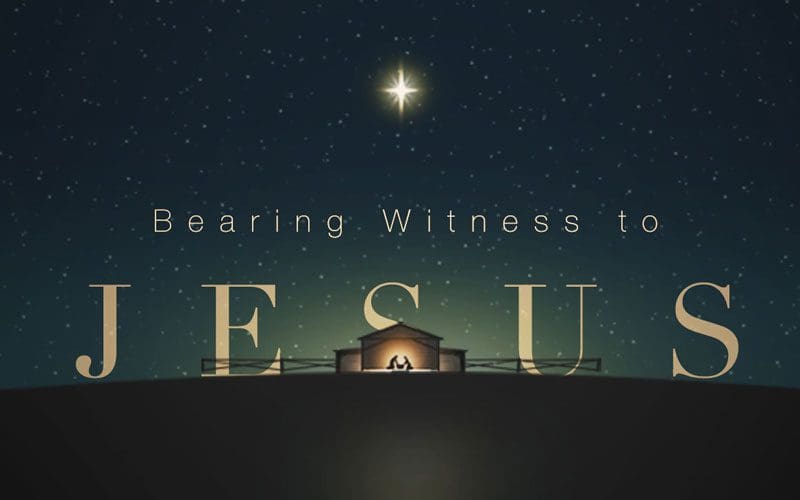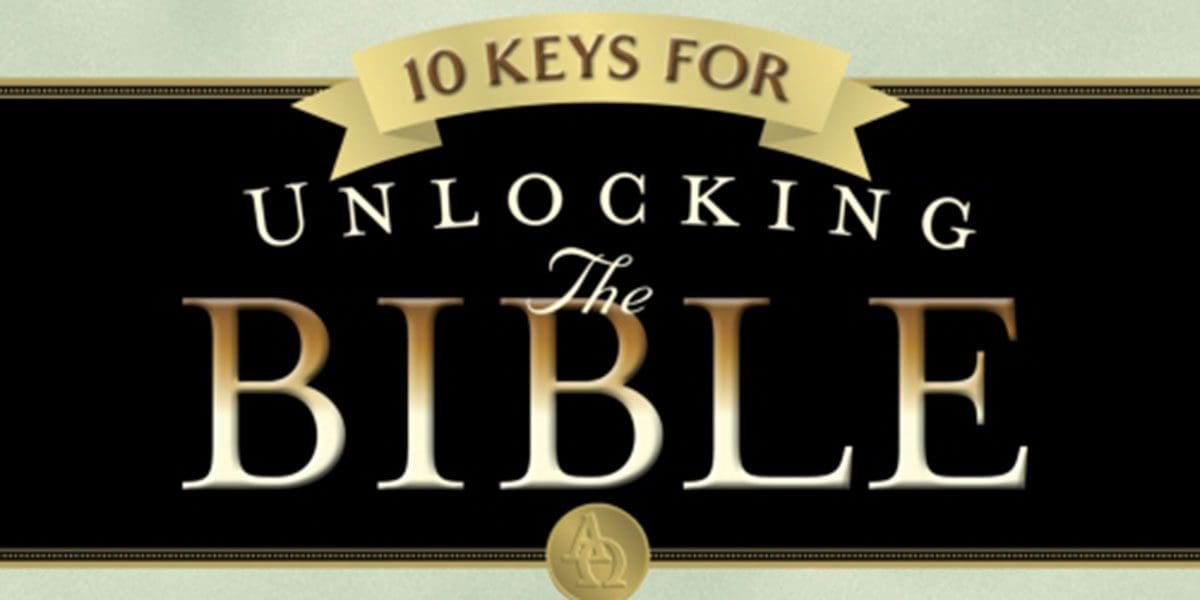And the angel answered her, “The Holy Spirit will come upon you, and the power of the Most High will overshadow you; therefore the child to be born will be called holy—the Son of God.” (Luke 1:35)
Today we come to the last message in our series, Bearing Witness to Jesus. We have seen that the birth of Christ was announced from heaven, and then was confirmed on earth by various people who gave witness to Mary about the unique glory of the Son she bore.
We have seen how each of them bore witness to a particular aspect of the glory of Jesus: Elizabeth, that He is the Lord; the shepherds, that He is the Savior; Simeon, that He is the Christ; Anna, that He is the Redeemer; the wise men, that He is the King.
Today, I want us to go back to the announcement itself and focus on the words of the angel Gabriel that give us the greatest statement of all regarding the glory of Jesus Christ. Not only is Jesus Christ the Lord, the Savior, the Messiah, the Redeemer and the King, but He is these things precisely because He is the Son of God.
The angel Gabriel answered Mary and said, “The Holy Spirit will come upon you, and the power of the Most High will overshadow you; therefore the child to be born will be called holy—the Son of God” (Luke 1:35).
Witnesses: Jesus is the Son of God
I want us to ponder together today this marvelous truth that Jesus is the Son of God. Then I want us to see that because he is the Son of God, there is freedom, confidence, peace, and joy in Him for all of us today.
Jesus: My Father
You see this in the first recorded words of Jesus: “Why were you looking for me? Did you not know that I must be in my Father’s house?” (Luke 2:49). Our Lord says “my Father,” when he is referring to God, “All things have been handed over to me by my Father” (Matt. 11:27).
Jesus says, “your Father,” when he was speaking with his disciples, “In the same way, let your light shine before others, so that they may see your good works and give glory to your Father who is in heaven” (Matt. 5:16).
It is very striking that Jesus speaks of God as “my Father” and “your Father.” There is only one time when He says, “our Father,” and that of course is in the Lord’s Prayer. The “our” refers not to Jesus and us, but to His disciples praying together. “Pray then like this: ‘Our Father in heaven…’” (Matt. 6:9; Luke 11:2).
Jesus seems to go out of His way to avoid saying, “our Father.” After the resurrection, He sends word to the disciples, “I am ascending to my Father and your Father” (John 20:17).
He is “my Father” in one sense, and he is “your Father” in another sense. The great fourth century African leader, Augustine, drew attention to the significance of this: “Jesus is saying, ‘He is My father by nature, He is your father by grace; He is My Father by right, He is your Father by adoption.’” [1]
This distinction was quite clear to the chief priests, to the Pharisees, and to all who heard Jesus speak, “This was why the Jews were seeking all the more to kill him, because not only was he breaking the Sabbath, but he was even calling God his own Father, making himself equal with God” (John 5:18).
The reason they wanted to kill Jesus is that he spoke about God as his Father in a way that was quite different from the way any worshipper of his day would have spoken of God. There is a special intimacy about the way Jesus addresses God as His Father. You see it in the Garden of Gethsemane: “My Father, if it be possible, let this cup pass from me; nevertheless, not as I will, but as you will” (Matt. 26:39).
You see it in our Lord’s Prayer in John 17: “Father, the hour has come; glorify your Son that the Son may glorify you” (John 17:1). You see it when Jesus is nailed to the cross: “Father, forgive them, for they know not what they do” (Luke 23:34).
There is only one time when our Lord does not address God as Father – the cry of dereliction at the height of His suffering as our sin bearer: “My God, my God, why have you forsaken me?” (Mark 15:34). Jesus experiences a shutting off of the flow of love between the Father and the Son that has been going on for all eternity
Scripture: Son of God
1. The first announcement of who Jesus is:
The angel says to Mary, “The Holy Spirit will come upon you, and the power of the Most High will overshadow you; therefore the child to be born will be called holy—the Son of God” (Luke 1:35).
2. The identity of Jesus confirmed from heaven at his baptism:
A voice from heaven said, “This is my beloved Son, with whom I am well pleased” (Matt. 3:17).
3. The focus of Jesus’ first temptation:
The tempter came and said to him, “If you are the Son of God, command these stones to become loaves of bread” (Matt. 4:3).
4. The first charge brought against Jesus:
The high priest said to him, “I adjure you by the living God, tell us if you are the Christ, the Son of God” (Matt. 26:63).
5. The clear confession of Jesus:
Jesus said to [the high priest], “You have said so” (Matt. 26:64).
Or as we would say today, “You said it!”
Just as it is important to preserve the distinction that Jesus makes between “my Father” and “your Father,” so it is important to observe that the phrase “Son of God” means something quite different when it is applied to Jesus from what it means anywhere else.
In the Old Testament, the book of Job, angels are referred to as “the sons of God” (Job 1:6). And when God is talking about the nation of Israel, he says: “When Israel was a child, I loved him, and out of Egypt I called my son” (Hos. 11:1).
In the New Testament, our Lord says, “Blessed are the peacemakers, for they shall be called sons of God” (Matt. 5:9). The apostle Paul tells us, “All who are led by the Spirit of God are sons of God” (Rom. 8:14).
The Uniqueness of Jesus
Jesus refers to himself as “the” Son
“No one knows the Father except the Son and anyone to whom the Son chooses to reveal him.” (Matt. 11:27)
And it is on this basis that Jesus says, “Come to me, all who labor and are heavy laden, and I will give you rest” (Matt. 11:28).
The Scriptures refer to Jesus as the “only” Son
The Word became flesh and dwelt among us, and we have seen his glory, glory as of the only Son from the Father, full of grace and truth (John 1:14).
John later writes, “For God so loved the world, that he gave his only Son, that whoever believes in him should not perish but have eternal life” (John 3:16).
There is a great difference between the sonship of Jesus and the way in which we may become the sons of God. Jesus is the Son of God by nature; we become sons of God through adoption into his family by grace. Jesus has always been the Son of God; we must become God’s children, and we do that when we receive him: “To all who receive him… he gave the right to become children of God” (John 1:12).
Jesus is “God with us”
These are written so that you may believe that Jesus is the Christ, the Son of God, and that by believing you may have life in his name. (John 20:31)
The great purpose of John’s Gospel is to introduce the Son of God and tell us who He is. John knew the world of Greek mythology was full of stories about gods behaving badly and having children who were more than human, but less than gods (through their union with women).
John wants to make it crystal clear that when he speaks of Jesus as the Son of God, he is not speaking of God begetting a child, but of God himself becoming man. For this reason, he begins his Gospel not with the Son, but with the Word: “In the beginning was the Word, and the Word was with God, and the Word was God” (John 1:1).
Jewish readers would understand John’s meaning clearly. In the Old Testament, God’s Word is His power in action, fulfilling His purpose. God said, “Let there be light and there was light.” So the Word of God is God at work.
John tells us that “the Word became flesh and dwelt among us, and we have seen his glory, glory as of the only Son from the Father, full of grace and truth” (John 1:14). So now we know who the Son is. He is the Word of God made flesh – God fulfilling His purpose – God himself getting His will done.
The book of Hebrews says of God’s Son that, “he is the radiance of the glory of God and the exact imprint of his nature” (Heb. 1:3). Think about the sun and its radiance – they are inseparable. The radiance is the outpouring of the sun. There is no sun without the radiance and there is no radiance without the sun. Jesus Christ, the Son of God, is the radiance of God’s glory. He is the outpouring of all that God is. He is God with us.
This series has been answering the question “Who is Jesus?” That takes us to the foundation of Christian faith. Everything else rests on this.
People have many questions about Christian faith. Some have difficulty believing in miracles, especially Jesus rising from the dead. Some have difficulties with the claims of Jesus, “No one comes to the Father except through me.” But when you come to the Gospels, the first truth that confronts us is the revelation of who Jesus is. Our Lord himself puts this at the center: “Who do you say that I am?”
In his book, Knowing God, J. I. Packer writes these words: “The incarnation is in itself an unfathomable mystery, but it makes sense of everything else that the New Testament contains.” [2]
If Jesus was simply a uniquely godly man, his miracles would be suspicious, his claims would be preposterous, and a thinking person would treat any promise that came from His mouth with extreme skepticism.
But if God came into the world in Jesus Christ, as the Scriptures tell us He did, then you would expect Him to say things that no one else could ever say, and do things that no one else could ever do. It is much more startling that the Son of God should die than that He should rise again! The incarnation is in itself an unfathomable mystery, but it makes sense of everything else that the New Testament contains.
When you settle in your mind and heart who Jesus is – that He is the Lord, the Savior, the Christ, the Redeemer and the King, and that He is all these things because he is the Son of God, then you have laid the foundation of faith on which everything else will rest. You can rest the weight of your life, your death, and your eternity on Him.
How to Respond to Jesus, the Son of God
What difference will this truth make in your life today? My prayer is that each of us will respond to this great truth that Jesus is the Son of God in four ways:
1. Seeing His love, you will trust Him
For God so loved the world, that he gave his only Son, that whoever believes in him should not perish but have eternal life. (John 3:16)
The Father giving the Son, and the Son leaving the Father’s side to enter our world is the supreme proof of the love of God for you.
Donald Macleod says, “There was a unique bond between the Father and the Son arising from the fact that the Son was uniquely lovable and the Father was uniquely affectionate. God could not have made a greater sacrifice. His love is astonishing precisely because at this point He put the world before His Son. The statement ‘God gave the world for His Son’ would evoke no wonder, but ‘God gave His Son for the world,’ borders on the incredible.” [3]
A few days ago Karen and I were watching The Profit, a show in which Marcus Lemonis, an entrepreneur from Chicago, invests his own money to turn round ailing businesses.
In this episode, he was working with a couple who ran a struggling company. The husband was somewhat brittle. A creative artist, he wouldn’t listen to feedback. His wife said, “He just shuts down when someone gives him feedback.”
Even though the husband had a couple of employees, he seemed to feel that if a thing was to be done right, he had to do it himself. In the past, he had outsourced manufacturing, but there had been a problem, and as a result, the whole operation was brought back to his facility – although it was completely inadequate.
At one point, Marcus said, ‘Tell me what happened in your life that you don’t trust anyone.”
The man teared up and began to speak about how his parents had divorced when he was young, and of how he in his early years he had lived under a barrage of verbal abuse. This is a story that many people, including some of us, are able to relate to really well. But when you know that you are loved, you will be able to trust.
So look at this love of Christ! God so loved you that He gave his only Son for you. Here is the Father face-to-face with the Son He loves. He did not give up you for His Son; He gave up His Son for you. Why in the world would you not trust Him?
When you trust Him, it will make a huge difference to the way you relate to others. Other people may let you down, but even if they do, you can say, “I know One who loves me, and I can trust in Him!” Knowing the love of Christ will set you free from the binding effects fear.
2. Seeing His authority, you will obey Him
A cloud overshadowed them, and a voice came out of the cloud, “This is my beloved Son; listen to him.” (Mark 9:7)
This is the voice of the Father speaking to the inner circle of disciples – Peter, James, and John. One thing that we learn from this is that it is possible to be, in some sense, a follower of Jesus and not really to listen to Him: “Why do you call me ‘Lord, Lord,’ and not do what I tell you?” (Luke 6:46).
When the Son of God speaks, even the wind and the waves obey Him. How great must be the sin of the human heart that we find it so hard to obey Him.
But think of the blessing that you can find here. I don’t know about you, but I feel at peace when things are in order. When peace reigns and order prevails, I am happy. But when chaos reigns, I am in trouble. The truth is that so much of our life in this world is beyond our control. I do not know what will happen between now and the end of today.
How are we going to find peace in this world, where so much is beyond our control? Think about the peace that would be yours if you could say, “My life is truly in the hands of the One who says, ‘All authority in heaven and on earth has been given to me’” (Matt. 28:18).
Think of the confidence it would give you if you could say, “I live under the authority of the Son of God who is the sovereign Lord of the universe.” You would be able to go into the world, with all of its danger and uncertainty, confidently, which is what He calls you to do.
3. Seeing His power, you will hope in Him
[He] was declared to be the Son of God in power according to the Spirit of holiness by his resurrection from the dead, Jesus Christ our Lord. (Rom. 1:4)
Some of you are going through difficult times and you don’t know what the future holds for you. It’s very dark right now. You need to know that the Almighty became helpless. The eternal God grew through infancy and childhood. The One who knows all things, read the Scriptures and learned them. The One who hears and answers prayer, kneels down and offers them up. The Son of God knew what it was to be tired and hungry. He knew what it was for his soul to be overwhelmed with sorrow, and he was crucified in weakness on a cross.
But the story does not end there. The Scripture says that he was raised in power! He was “declared to be the Son of God in power… by his resurrection from the dead.” The Son of God has triumphed over death and he lives in the power of an endless life. He gives that life to all who trust in him.
That is why John says, “These are written so that you may believe that Jesus is the Christ, the Son of God, and that by believing you may have life in his name” (John 20:31). When you believe in the Son of God, you have an eternal life! You have a future of unclouded joy ahead of you – whatever you face today. Think of the strength, the courage that will give you, when you come to the darkest place of your life!
For those who are getting older and you feel that life is beginning to slip away – you have more life ahead of you than you can begin to imagine. For the person here today who is disappointed – you feel that you have missed out. There are things you would like to have happened. You have life in His name, and the life that you have is everlasting! There is no missing out on life for a person who is in Jesus Christ!
4. Seeing his glory, you will worship him
“Father, glorify me in your own presence with the glory that I had with you before the world existed.” (John 17:5)
The glory, brightness, and radiance of Jesus is so great that when the apostle John, who sat beside Him at the Last Supper, saw His glory, he fell down at his feet as though dead: “But [Jesus] laid his right hand on me, saying, ‘Fear not, I am the first and the last, and the living one. I died, and behold I am alive forevermore, and I have the keys of Death and Hades’” (Rev. 1:17-18).
Here’s the future for all who are in Christ: You will see his glory, and you will share the joy of the Son of God forever. Better start getting ready! Trust him. Obey him. Hope in him. Worship him. He is the Son of God. He came into the world. He died to bring us to the Father, and he lives to bring us safely home.
[1] Cited in Leon Morris, John, p. 842, Hendrickson, 2000.
[2] J. I. Packer, Knowing God, p. 47, InterVarsity Press, 1993.
[3] Donald Macleod, The Person of Christ, p. 73, IVP Academic, 1998.
[elementor-template id=”128476″]






